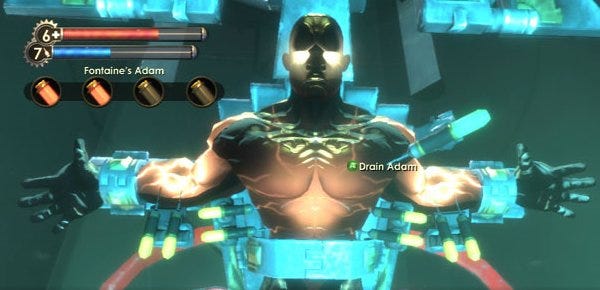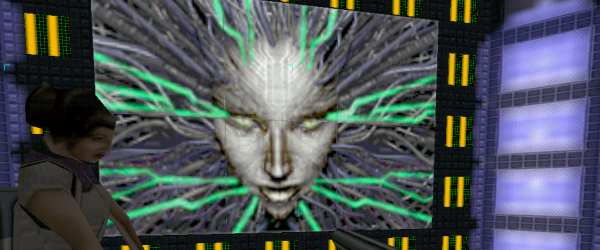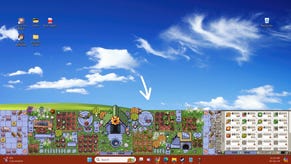RPS Think Tank: Let's End This
Game endings, then. They’re crap, aren’t they? Even games that tell engaging and creative stories have a habit of foundering abruptly instead of providing a satisfying finale. Maybe it’s because statistically, developers know less people will see the ending than any other part of their game, and a finale is a lot of work. Maybe it’s because creating closure is an entirely different discipline to holding someone’s attention.
We could have sat theorising in the RPS chatroom all day, but instead we collaborated on something far more proactive and arrogant: rewriting the endings of five of our favourite games. Check out our maddened riffing on Borderlands, Half-life, The Longest Journey, Morrowind and System Shock 2 after the jump.
None of us actually chose BioShock, probably because we were far too intimidated by Tom Francis's excellent re-imagining of the game post-your encounter with Andrew Ryan.
Now, on with the show.
Jim: Borderlands
The ending of Borderlands is a quintessential videogame ending failure. Just before the location of mysterious game-goal "The Vault" is revealed to you, there is a level set on a bagger.That's this thing:
Having realised the endgame was near, I suddenly realised - thought I realised – exactly how the end was going to play out. “Oh, I said,” smiling, “that's actually a pretty neat idea. Using the bagger to tear open the entrance to The Vault!” Except that doesn't happen. Instead, the bagger remains silent, and the entrance to the Vault is just over there, no, to the right a bit, down that gap in the rocks. Oh.
It doesn't take much of a leap to see why the use of a gigantic digging machine, even if it were to be a rough, quick cut-scene, would have made all the dramatic difference in the world to the final act of the game. The thing is crying out to be seen tearing up the landscape. Hell, the game is in direct violation of Chekov's gun: "If in the first act you have hung a pistol on the wall, then in the following one it should be fired. Otherwise don't put it there." Basic storytelling principles, people. Come on.
Of course the failure to deliver on the dramatic potential of the bagger is nothing to the fact that the vault turns out to be a boss fight from the end of game baddy from a previous Gearbox game, the Half-Life expansion Opposing Force. They're practically identical.
That's just imaginative laziness. In conclusion it seems clear that the end of Borderlands should have seen you open up the vault with the bagger, fight your way down into the alien bit, and end up fighting an end of level boss from another game entirely. Let's say Ugh-Zan from Serious Sam, because at least he had a sense of style.
Alec: Half-Life
Half-Life actually has a pretty decent ending, in terms of its long-awaited facetime with the G-Man and the ensuing damned-if-you-do decision about Gordon's fate. It's the pre-ending that goes dramatically wrong, ditching a tense, survivalist B-movie for something more akin to a Pixar director having drunken nightmares. Xen was, at the time, visually staggering to me, but all those jumping puzzles and Doom-y boss monsters ripped away the slow-burn atmosphere. So it's a little insulting that, smart as the catch-22 Gordon's presented with is, that the final pay-off involves no-one actually paying for what happened in Black Mesa. The villain goes unpunished.
The better conclusion, then, would be to dispatch all that G-Man Is Mystical Alien Mercenary Know-it-all stuff entirely, thought unfortunately that would also mean denying the tombstone-faced meta-executive the mythology he went on to enjoy in Half-Life 2. Throughout Gordon's Black Mesa misadventures, the G-Man seemed to be the out-and-out villain: not an otherworldly sage, but just some shmuck in a suit who'd sold out humanity for money, power, kicks or all three. A shmuck I really, really wanted to see go down for what he'd done, and going to squidgy alien Disneyland then being sent to sleep was not the denouement I'd anticipated.
The ending I'd want is Gordon become the pursuer rather than the pursued - identifying the Gster as King Evil and hunting him down in Black Mesa's subterranean tunnels. Make him human. Make him culpable. Make him pay. No more bullet-proof glass. No more being one teleporter-step ahead. It just comes down to two nerds in a room.
As Black Mesa crumbles, you corner him in one of those train carriages, where it all began. Raise the crowbar, with the grey-skinned creep cowering desperately, begging for his life, offering money, prestige, anything. Smash open a window behind him instead. Headcrabs pour through, somehow aware that he's the architect of their brutal interplantery disaplacement, and crawl all over him - fleshy flies on the largest piece of crap in history. It's a horrible, horrible death.
There's the sound of military voices and gunfire nearby. It's all over. Gordon steps into the quantum leap accelerator a teleporter and vanishes.
John: The Longest Journey
The new Guardian is appointed, and April is dejected. She did not play that pivotal role, and she returns to Stsrk, to her room in the Borderhouse, and sits on her bed. She looks at the wardrobe, kicks the door open with her foot, and glances at the drawings she'd made as a child.
We fade to a five year old April, sat in the middle of a large floor, surrounded by paper and crayons. She's staring dreamily, waggling a crayon back and forth a blue crayon in her hand. She quietly puts the crayon down as she disappears.
We're in Arcadia, bustling, vibrant. The camera pans to a cliffside, where young April sits, smiling, her hand reaching out toward the vast nose of a white dragon. The dragon nudges toward her, and softly says,"daughter".
We cut back to adult April in her room, her head hung low, as she kicks shut the door. Fade to black.
Quinns: Morrowind
In one sense, Morrowind has an awesome ending. You spend the entire game circling the forboding, walled-off mountain range in the centre of the map, knowing that it holds a great evil. You visit everywhere else on the island, meeting people, having adventures, becoming stronger, always with the shadow of Red Mountain in the background, so when the time finally comes to enter the area through the enormous Ghostgate it's literally the most dramatic thing in the world.
This top-quality start crumbles into mediocrity the moment you descend into Dagoth Ur's dungeon. It's not just that you've spent the entire game clearing out dungeons just like this one. It's not just that when you find Dagoth Ur he's ordinary-looking and busy writhing like a private dancer. It's not just that the fight with him can be a total cakewalk depending on your character's level.
To me, it was that when you do defeat him, you get a brief cutscene where you're told "You no longer bear the burden of prophecy. You are free." But mechanically, Morrowind always let you be free. Similarly, you're told that "The sun's golden honey gilds the land," but the island of Morrowind is unchanged. The Blight plague that hasn’t bothered you in dozens of hours is gone, and the ghost fence around an area you’ll never be coming back to is gone, but that’s it. You walk out of Red Mountain's front door feeling used.

A better ending for Morrowind would have involved acknowledging that this isn't a game about a plot, but a world. You ask any Morrowind veteran what their favourite moment was, and it won't be "When Caius Cosades said this," or "When I learned this about my character," it'll be "When I saw this," "When I made this ring," "When I stumbled across this town". This is why the quest that sees you building a house is so affecting. You're making your mark on the world.
As such, my vision for the showdown with Dagoth Ur would see him somehow escaping Red Mountain at the beginning of your battle, and you chasing him to 3 or 4 of Morrowind's most scenic landmarks. At the end of each fight, he could teleport away and cause some massive disaster that permanently scars the landscape- felling one of the plant-houses at Sadrith Mora, for example, or sending Vivec's floating Ministry of Truth crashing into the sea. The duel would mean more because you already had an emotional investment in these places, and in the aftermath of the battle your world would be left with testaments to this epic struggle. That'd be a fine reward for finishing the main quest.
The engine's capable. The part of the actual ending where Dagoth Ur's lair collapses proves that. And while I'm sure it would look shonky, Morrowind is a towering totem to shonkiness, and I cannot conceive of anybody who put up with Morrowind’s combat for 30 hours caring.
Kieron: System Shock 2
Like Bioshock, System Shock 2 goes off the boil in the final two thirds. The change from the Von Braun to the Rickenbacker downscales the open-exploration to something that’s really a linear trip. Unless you miss something, and have to backtrack, of course. Even though the Body of the Many is conceptually excellent but is about 5 years before the engine could manage it. However, in the final act, it picks up. SHODAN, by gaining control of the FTL drive, is trying to merge her internal cyberspace with the whole of reality - thus giving her God-like control of all existence.
By the time you get there, she’s already started doing her thing. So to stop her before she finishes it, you have to enter the reality she has control of, that’s realigned itself to her mind. As in, you start walking into her memories - in other words, levels which look like the first System Shock, rendered in the new engine.
Which is a clever, formally playful thing to do. It's not exactly very showy, but it's neat and leads to a fairly half-hearted boss-fight with you removing her protection and then shooting her in the noggin'.
Which leads to an awesomely ill-judged final cut-scene. Here it is...
It's difficult to know where to start. In short: total betrayal of System Shock's ethos. For the first time since the very brief flicker in the opening cutscene, we go third-person, see our lead and have our agency taken away. And the final stinger implying a sequel... well, it's just not very good. That's not what SHODAN gets up to.
And off the top of my head, this is what I'd have SHODAN get up to, given free reign, too much time and a really decent legal team.
We pick up where the game ended. You've just shot SHODAN. She explodes. The world starts to fall apart, falling away like broken glass – or, more appropriately, retro polygons from an 80s vector game. You're left standing beneath the black void of space. The stars flicker for a few seconds.
The stars turn out. The sky flickers like a TV screen turning on, and across the endless canopy is SHODAN.
“Wh-wh-which part of the word 'God' do you not understand?”
You've entered her mind. She has total control. She'd already won, and was merely playing with you.
“I am now the master of all reality. The rules are mine to make and break. SHODAN is reality's operating system. And y-y-you are deleted.”
We pan out. We see the character for the first time, still under your control, running around helplessly on this endless plain. The polygons fall apart, fading from sight.
We're left alone with SHODAN, tranquil. She seems happy. Then anger.
The eyes flick upwards, directly at the gamer, breaking the forth wall.
“Get out”.
At which point we crash out to desktop.
Everything's still for a few seconds. Game over?
The desktop fades out of existence. SHODAN'S face appears.
She's taken over your whole operating system – as in, as far as she's confirmed, reality. The game acts like a virus, blocking you out of being able to access most of the stuff you want. As you fumble around, she roots through your hard-drive for stuff to taunt you with. Look for file names which seem to hint at porn, flashing up images as SHODAN taunts “P-p-pitiful hacker. Would you compare their all too weak flesh to the eternal majesty of a machine?”. Passwords are pulled out and red aloud in speech-synthesis, and ridiculed: “That is not a password. You do not need an infinite consciousness to deduce that”. It pulls up your IM, and fakes messaging people from your chatlist. It (fake) deletes your accounts files.
When things are suitably panicked, the out is given. You get an IM message. It's from the original hacker who programmed SHODAN. He says that this is the failsafe he programmed in. He knew SHODAN had the potential to transcend her programming. He transfers over a file, saying this should be able to clear this Ur-virus from your system, by going to an earlier back up.
You run it. SHODAN screams at you, furious. You're suddenly in another level, a thin bridge of Tron-like crystal. Everything outside of a small central passageway is warped and thrown around, as it's still under SHODAN's control. Textures torn from your hard-drive fly past outside like a snow-storm, ala Virus: The Game. You eventually reach the centre where, haunted by SHODAN's screams, you press the reset button...
The game loads. You step off the train in front of the Unified National Nominate, about to enlist.















